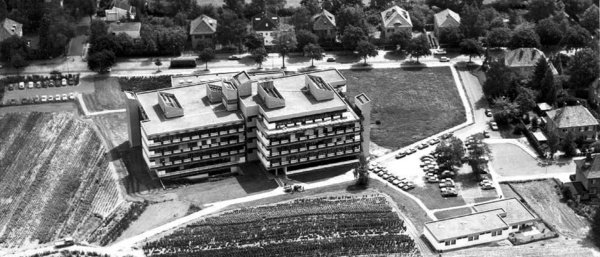
History
How we became who we are
The Max Planck Society
The MPIMG is embedded in the Max Planck Society, one of Europe’s leading research organizations. The resources provided by the Max Planck Society, empower us to invest more time for research, gives us the ability to innovate and adapt, and creates an environment in which we can take more risks. The vast network of research institutes offers ample opportunity for collaboration and professional growth.
History of the Max Planck Institute for Molecular Genetics
The Max Planck Society is the successor to the Kaiser Wilhelm Society, founded in Berlin in 1911. The Kaiser Wilhelm Institute for Anthropology, Human Heredity and Eugenics (KWIA) was established in Berlin in 1927 and later became involved in the crimes of the Nazi regime. After the war, some of the former departments were transferred to the newly founded Max Planck Society, and in 1953 the institute was renamed the MPI for Comparative Hereditary Biology and Hereditary Pathology (MPIEE). However, a conscious decision was subsequently made to break with the past.
In the 1960s, as visionaries in the society and Germany saw the potential of the newly emerging field of molecular genetics, a new institute was founded under different leadership and name. Our Max Planck Institute for Molecular Genetics (MPIMG) was brought to live in 1964 with the appointment of Heinz-Günther Wittmann and Heinz Schuster as directors, shortly followed by the appointment of Thomas Trautner (1965). During the opening ceremony, the then President of the MPG, Adolf Butenandt (1903-1995), invoked a break with the past, calling the decision to establish the MPIMG as a "new foundation".
At this time, research at the MPIMG was focusing on DNA replication and gene regulation in bacteria, bacterial phage and fungi (Depts. Schuster and Trautner), as well as on the structure, function and evolution of ribosomes (Dept. Wittmann). In 1971, the three departments and four independent junior research groups, the later Otto Warburg Laboratories, moved into a new building at Ihnestraße. After the untimely death of H.-G. Wittmann in 1990 and the retirement of H. Schuster in 1995, the appointments of Hans Lehrach (1994, Dept. of Vertebrate Genomics) and Hans-Hilger Ropers (full-time since 1997, Dept. of Human Molecular Genetics) brought about a major shift in the scientific orientation of the Institute. After the retirement of Thomas Trautner in 2000, Martin Vingron was appointed as head of the new Department for Computational Molecular Biology. Also in 2000, Stefan Mundlos, Professor of Genetics at Charité-Universitätsmedizin Berlin, was jointly appointed as head of the independent research group Development and Disease at MPIMG. In 2003, Bernhard Herrmann was appointed as director and head of the Department of Developmental Genetics (joint appointment with the Charité – Universitätsmedizin Berlin).
Since the appointment of Alexander Meissner as a director in 2017 the MPIMG has started a process adjusting the scientific focus, reenergizing the community to establish a highly interactive and collaborative culture across the institute. This includes also a push towards shifting scientific paradigms and truly embracing curiosity-driven discovery. Moreover, we use the above listed core values as guiding principles to lead the institute into vibrant and productive future. Implementing our vision also necessitates the expansion of our research faculty with world-leading investigators as well as further building out our already outstanding infrastructure. Currently, a major recruitment effort across all levels is underway and many lasting bridges across the larger scientific environment in Berlin and beyond are built.
